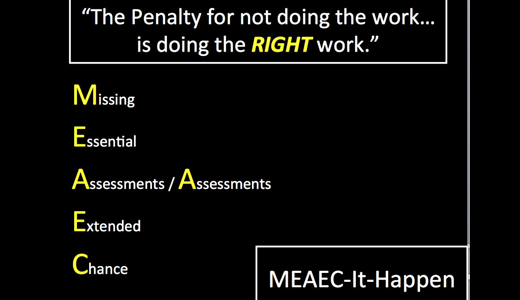Part 1: Practical Failure Prevention Grading Strategy Example: MEAEC-It-Happen! Ensuring ALL Student Work IS Essential
As the new school year begins there are many possibilities for the coming year & few definitive truths. One truth is that students are going to fall behind. They will fall behind in content / skill understanding & mastery, behind in work completion, and simply behind in learning. What far too often occurs is that teacher focus far too much on the quantity and completion of tasks and assignments; as opposed to the critical and essential evidence of learning any student task should convey.
Imagine this scenario: Karen, a 9th grade student has had a reasonable start to her freshman year. After the first 4 weeks of school she was not only passing all of her classes, but she only had two C’s. She struggled mightily in junior high barley passing anything so this was a pleasant surprise for her parents. She had been able to keep up with all seven of her classes. Around mid-October, once she started playing basketball, she fell behind in on a few assignments in Language Arts. She did fairly well on the unit 3 assessment (non-fiction argument writing) and her teacher, Mr. Jones, had moved onto the subsequent units (4 & 5). Her grade at report card time was ‘below passing’ because of these missing assignments (because Mr. Jones still averages grades—a topic for another time!). The next week, she missed practice two days (& then a game because of missed practice) to make up the assignments from unit 3—which the class had completed over a month ago. Karen actually did well on that unit and completing these assignments actually distracted her from what the class was current studying (plot & theme of non-fiction texts). Karen completed here make-up work—With as half-hearted of a job as she could and then at night after practice, instead of keeping up with the work on non-fiction plot & theme, she felt she ‘had done her work for the night!’ …and ended up getting behind in this unit. This lead to her often trying just to get work completed without any thought of effort to get it done.
Perpetuating The Behaviors We Most Despise
The penalty for students not doing their work should be doing their work—BUT teachers have to ask themselves a hard but important question when they don’t the first time: Is it that specific assignment / task I want my students to do or do I want to make sure they are focusing on the right content for their learning today?
When students are asked make up work that is not aligned to the current topic of study they are detracted from going deeper into the present learning goals & objectives. Students learn to not value doing quality work when they are completing tasks from a unit that was completed 3-4 weeks prior. This is compounded if they know it is just so their teachers can add it into a grade book for some hopeful point accumulation. Students are very likely to do so sloppily, haphazardly, & put forth just enough effort to get by. That same type of work ethic (or lack thereof) will likely come out again. We have to ask ourselves as teachers: do we even wonder why we get poor quality from students today when we allowed them to just get by completing a task to fill the grade-book yesterday?
Strategy: MEAEC-It-Happen!
As I said, as many have before me, students should never be immune to completing tasks and assignments that are required to demonstrate mastery evidence. I think, as teachers, we know not all of the tasks we assign students are completely essential for learning. The key is making sure any work students do can be used as an assessment for us to know what to do next instructionally. This is especially true for any work students are doing make-up. Above all else the work must be essential!
MEAEC stands for missing essential assignments or assessments extended chance (Nagel, 2015). MEAEC is a practice that aligns well to the SI2TE Model Framework: by ensuring we gather the right evidence to know how to support students in danger of failure (Nagel, 2015). MEAECs become an opportunity for students to make up missing work as well as a forced choice for students to complete essential work.
Collaboration Related to Learning Progressions
When designing any task, but for sure one to make up a missed learning tasks, teachers must ensure that the work students are asked to complete is essential to the student’s next step in learning. Larry Ainsworth (2014) reminds us that, “Often the deep thinking required for solid instructional planning takes place in isolation…. Deciding the learning progressions together makes crystal-clear the instructional sequence,” (p.180). Teachers must look at where students, behind in work and learning, are in terms of their needed next steps. It is from these essential next steps the students need for their learning that they should be asked to demonstrate mastery—not some pre-determined task that might or might not support their growth. Marzano reminds us that teachers are less certain about a student’s level of mastery—The more assessment evidence they need to collect (2006, p. 114).
Wouldn’t make more sense for Karen to do an extra task for the current unit on non-fiction plot & theme than to take her back to where she (and they class) had already left?
MEAEC part 2 post will be out next week (August 7th).
References:
Ainsworth, L. (2006). Common Formative Assessments 2.0: How Teacher Teams Intentionally Align Standards, Instruction, and Assessment. Thousand Oaks, CA: Corwin.
Marzano, R. (2006). Classroom assessment and grading that work. Alexandria, VA: Association for Supervision and Curriculum Development.
Nagel, D. (2015). Effective Grading Practices for Secondary Teachers: Practical Strategies to Reduce Failure, Recover Credits, & Increase Standards Based / Referenced Grading. Thousand Oaks, CA. Corwin Press.


